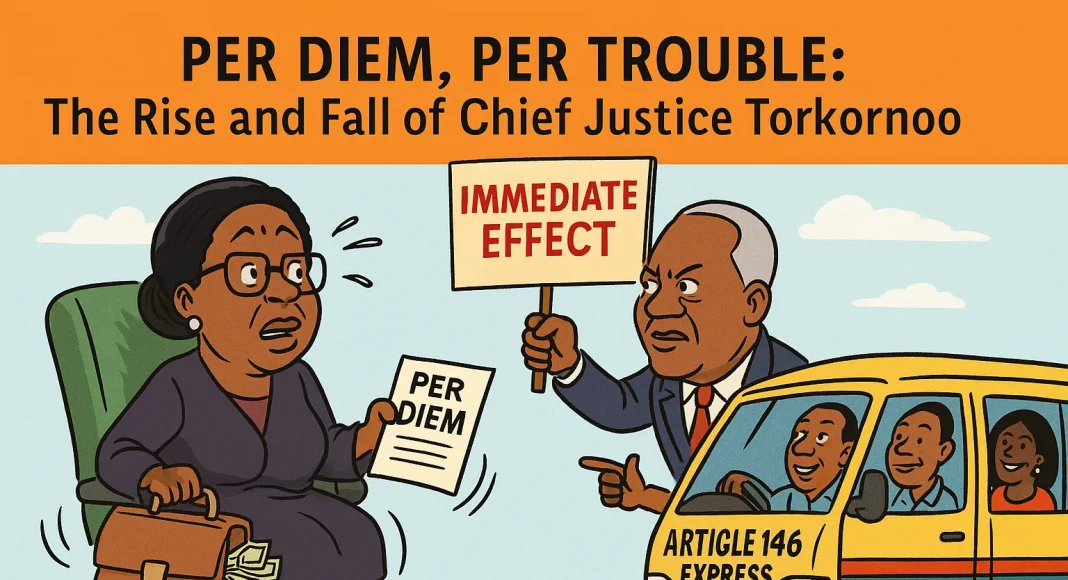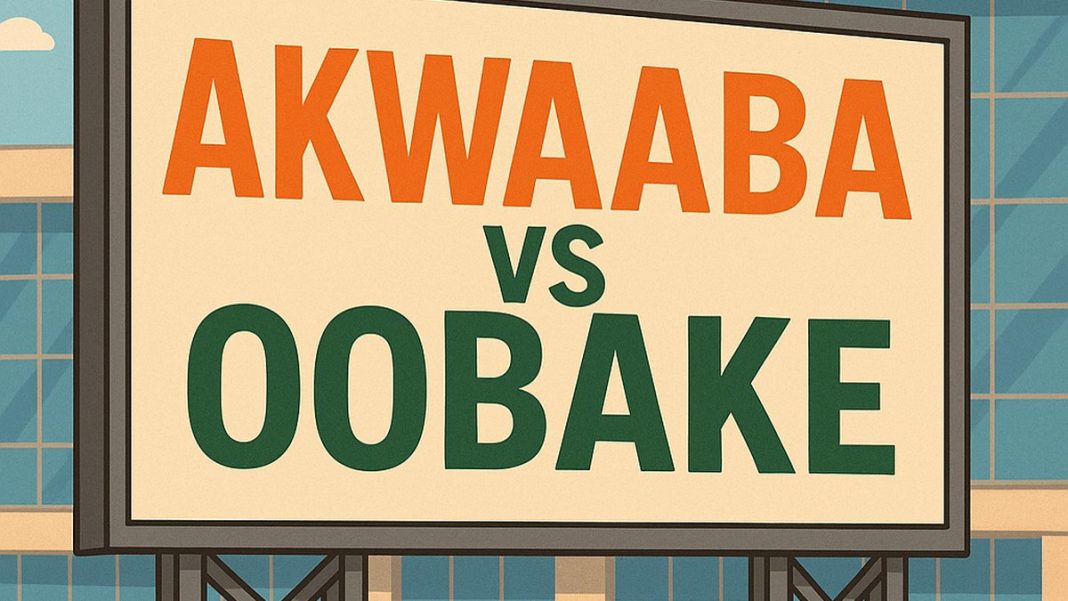🖼 Cartoon satire: Chief Justice Torkornoo packs per diem bags, hails Article 146 trotro, and waves her “Immediate Effect” placard.
In the Republic of Uncommon Sense, Chief Justice Torkornoo removal satire has become the trotro where comedy and tragedy ride side by side. This week, the dreaded phrase “with immediate effect” shook the judiciary harder than a Kumasi storm shaking a plantain tree. One presidential pen stroke, and the nation’s top judge was downgraded from Chief Justice to Chief Tourist — bags packed, gavel muted, and per diem receipts turned into a national comedy script.
⚠️ Affiliate Disclosure: This article contains affiliate links. If you click and purchase, I may earn a small commission at no extra cost to you — think of it as my humble per diem for serving satire in the Republic of Uncommon Sense.
And so, Chief Justice Gertrude Araba Esaaba Sackey Torkornoo, our learned lady with the gavel, found herself escorted out of office not by bailiffs, but by grammar: “immediate and without delay.”
The Case of the Arusha Vacation
Former Attorney General, Ayikoi Otoo, now moonlighting as a constitutional defense lawyer for common sense, came out swinging:
“What wrong did the woman commit? She only asked to travel—vacation in Arusha, Tanzania! The officers themselves worked out her entitlement. You don’t audit a Chief Justice with a machete; you audit her with a calculator!”
To Ayikoi, the matter was as simple as beans. A Chief Justice is entitled to travel. You fill your form, state your destination, and the bureaucratic machinery calculates your per diem, flight, and allowances—sometimes faster than ECG calculates your light bills. If there was any excess, was that not why God created auditors?
But alas, calculators were abandoned in favor of political machetes. A five-member committee, chaired by Justice Gabriel Pwamang and powered by Domelevo’s stubborn pen, declared that what Torkornoo called vacation was in fact an “avoidable and reckless dissipation of public funds.”
For daring to carry her husband and daughter along on a holiday in 2023, the committee concluded she had converted the judiciary into a family travel agency. Ghanaians suddenly realized that per diem is not per day—it is per trouble.
The Charges: Like Exam Questions Without Marking Scheme
The committee’s verdict turned the report into a textbook of Chief Justice Torkornoo removal satire, where per diem became per trouble.
The committee rolled out its findings like WAEC questions, three in number:
- Unlawful Expenditure of Public Funds – authorizing travel expenses for her family members on holiday trips, including per diem.
- Abuse of Discretionary Power – the mysterious transfer of one Mr. Baiden, described as reckless as a trotro driver making a U-turn at Kaneshie.
- Interference in Judicial Appointments – seeking to bypass due process in nominating Supreme Court justices, much like skipping the queue at Waakye Auntie’s joint.
The verdict? Misbehaviour. And in the dictionary of Ghanaian politics, misbehaviour is worse than treason.
Chief Justice Torkornoo Removal Satire – Mahama’s Pen vs. Article 146
This pen stroke was not just law, it was pure Chief Justice Torkornoo removal satire, written in suya charcoal ink.
Bound by Article 146(9) of the 1992 Constitution, which gives the President no room to dodge, John Mahama had only one option. With a pen hotter than suya charcoal, he signed the Warrant of Removal. Just like that, Ghana’s Chief Justice was history.
Some say Mahama was only obeying the Constitution. Others argue he was obeying politics. But whichever side you choose, remember this Ghanaian proverb: “When two elephants fight, it is the Constitution that suffers.”
Public Square Wi-Fi Placards
No Ghanaian controversy is complete without the open-air University called the Public Square, where everybody owns a Wi-Fi placard and data bundles of wisdom.
- Camp A: “For Camp A, this is nothing but another Chief Justice Torkornoo removal satire, staged with Wi-Fi placards and partisan cheers.”
- Camp B: “This is justice! She thought Mahama was her classmate. Off to Nogokpo she must go.”
- Camp C: “But didn’t Nana Addo use the same Article 146 to remove Charlotte Osei in 2018? Let us not pretend today is different.”
- Camp D (the kelewele philosophers): “Ei, Ghana. When goats took over Parliament, they only chewed grass. Now politicians chew the judiciary too.”
😬 Per diem stress, clenched teeth?
Public-square debates can wear out tempers—and smiles. If you’re keeping your grin through the drama, take care of it.
Saints, Sinners, and Selective Justice
Consider this irony:
- One president receives a petition against the Chief Justice he himself appointed. He throws it into the dustbin, the same way Ghanaians throw away plastic after drinking sachet water. Case closed.
- Another president receives a petition against the same Chief Justice and polishes it with Article 146 until it glitters. Case opened, case pursued, case executed.
Who is saint and who is sinner? As my grandmother used to say, “When the drumbeat changes, even the cripple must adjust his dance.”
Yesterday, when Charlotte Osei was removed as Electoral Commissioner, NPP supporters clapped like church ushers. Today, when Torkornoo is removed, the same choir sings a dirge. Tomorrow, when power changes hands again, another Chief Justice will be carried away like a sack of charcoal at Kejetia.
Institutions in Ghana don’t fall—they are pushed.
From Supreme Court to Supreme Circus
Let us be honest. Chief Justice Torkornoo was not merely a judge; she was a political judge. When she once ruled that a birth certificate was not enough proof of Ghanaian citizenship, the public gasped. Imagine your father’s name, your mother’s name, and your hometown written boldly, and yet you are told, “Sorry, you are still stateless until you produce a passport.”
Her favorite phrase was, “the law is the law.” But now the law has spoken again, this time against her. In Ghana, the law is like a trotro mate: it shouts “last stop” whenever the driver—politics—decides.
Domelevo’s Dagger
For Ayikoi Otoo, Domelevo’s decision turned the hearings into a courtroom drama that has gone down as a classic Chief Justice Torkornoo removal satire
The real shock for many was that Daniel Domelevo, former Auditor-General and saint of anti-corruption, sat on the committee. Ayikoi Otoo couldn’t believe it:
“I am surprised Domelevo was on it. We tendered evidence. He saw the judiciary travel policy. Yet he concluded misappropriation. Misappropriated what money?”
In Ghana, even saints occasionally hold daggers, especially when they sit on committees.
The Bigger Picture
What looks like constitutional order is often nothing more than another Chief Justice Torkornoo removal satire repeated in cycles.
This saga is not about Gertrude Torkornoo alone. It is about the future of our institutions. If every Chief Justice, Auditor-General, and EC Boss becomes a casualty of political convenience, then Article 146 is no longer a constitutional safeguard but a guillotine.
Today, it is Torkornoo. Yesterday, it was Charlotte Osei. The day before, it was Domelevo himself. Tomorrow, it may be another name we haven’t yet Googled.
The Republic of Uncommon Sense has perfected the art of recycling: not plastics, but institutions. For a deeper dive, revisit our earlier satire: Embattled Chief Justice Torkornoo & the Wi-Fi Placards.
Moral of the Story
At last, we sit in the trotro of justice, clutching our coins while a fresh Chief Justice Torkornoo removal satire plays out on the road ahead.”
In the end, what we are left with is a full-blown Chief Justice Torkornoo removal satire — where justice is performed like comedy on the national stage.
When a Chief Justice insists “the law is the law,” she forgets that in Ghana, politics is the law. And when presidents shout “immediate effect,” the Constitution becomes a mere footnote in the public square.
Ladies and gentlemen, let us not deceive ourselves. The judiciary is not blind; it only squints according to the colors of the party flag.
As for us citizens, we sit in the trotro of justice: the driver is politics, the mate is the Constitution, and we clutch our change, praying not to be dropped in the gutter.
And so, once again: “Immediate and Without Delay” has met Article 146. The Chief Justice is gone. Long live the Republic of Uncommon Sense.
📖 Laugh Through the Madness
Love sharp Ghana satire? Grab my book Once Upon a Time in Ghana: Satirical Chronicles from the Republic of Uncommon Sense — available on Amazon. It’s the only book where potholes, prophets, and politicians all get equal airtime.
FAQ
Why was Chief Justice Torkornoo removed?
A committee cited misbehaviour under Article 146, including per diem controversies, discretionary transfers, and interference in appointments.
What is Article 146 in Ghana’s Constitution?
It governs the removal of judges and certain officeholders, requiring investigation and presidential action once misbehaviour is established.
Is this political or constitutional?
Both narratives exist: some say it’s constitutional compliance; others say it’s selective justice depending on who holds power.









